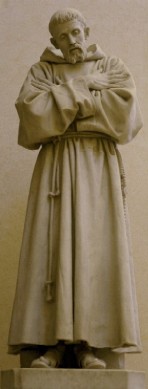
Collect (Opening Prayer)
Official Latin from the 1969 & 2002 Roman Missals
Orémus. Deus, qui salútis ætérnæ, beátæ Maríæ virginitáte fecúnda, humáno géneri praémia præstitísti, † tríbue, quaésumus, ut ipsam pro nobis intercédere sentiámus, per quam merúimus Fílium tuum auctórem vitæ suscípere.
Qui tecum vivit et regnat in unitáte Spíritus Sancti, Deus, per ómnia saécula sæculórum.
Official 1973 I.C.E.L. Translation (Used at Mass in English)
et us pray. God our Father, may we always profit by the prayers of the Virgin Mother Mary, for you bring us life and salvation through Jesus Christ her Son,
who lives and reigns with you and the Holy Spirit, one God, for ever and ever.
My Own Literal Translation
Let us pray. O God, by the fruitful virginity of Blessed Mary, You have brought forth to mankind the reward of eternal salvation, grant, we beseech You, that we may perceive her intercession for us, through whom we merited to receive the Author of Life, Your Son.
Who lives and reigns with You in the unity of the Holy Spirit, God, forever and ever.
Prayer Over the Gifts
Official Latin from the 1969 & 2002 Roman Missals
Deus, qui bona cuncta ínchoas benígnus et pérficis, da nobis, de sollemnitáte sanctæ Dei Genetrícis lætántibus, sicut de inítiis tuæ grátiæ gloriámur ita de perfectióne gaudére.
Per Christum Dóminum nostrum.
Official 1973 I.C.E.L. Translation (Used at Mass in English)
God our Father, we celebrate at this season the beginning of our salvation. On this feast of Mary, the Mother of God, we ask that our salvation will be brought to its fulfillment.
We ask this through Christ our Lord.
My Own Literal Translation
O God, You Who kindly begin all good things and bring them to completion, grant to us, rejoicing because of this Solemnity of the Holy Mother of God, that just as we glory in the beginning of Your grace we also rejoice in its perfection.
Through Christ our Lord.
Preface
Preface I of the B.V.M. - on the Motherhood of the Blessed Virgin Mary
Official Latin from the 1969 & 2002 Roman Missals
Vere dignum et iustum est, æquum et salutáre, nos tibi semper et ubíque grátias ágere: Dómine, sancte Pater, omnípotens ætérne Deus:
Et te in Maternitáte beátæ Maríæ semper Vírginis collaudáre, benedícere et prædicáre. Quæ et Unigénitum tuum Sancti Spíritus obumbratióne concépit, et, virginitátis glória permanénte, lumen ætérnum mundo effúndit, Iesum Christum Dóminum nostrum.
Per quem maiestátem tuam laudant Angeli, adórant Dominatiónes, tremunt Potestátes. Cæli cælorúmque Virtútes, ac beáta Séraphim, sócia exsultatióne concélebrant. Cum quibus et nostras voces ut admítti iúbeas, deprecámur, súpplici confessióne dicéntes:
Sanctus, Sanctus, Sanctus ...
Official 1973 I.C.E.L. Translation (Used at Mass in English)
Father, all-powerful and ever-living God, we do well always and everywhere to give you thanks as we celebrate the motherhood of the Blessed Virgin Mary.
Through the power of the Holy Spirit, she became the virgin mother of your only Son, our Lord Jesus Christ, who is for ever the light of the world.
Through him the choirs of angles and all the powers of heaven praise and worship your glory.
May our voices blend with theirs as we join in their unending hymn:
Holy, holy, holy ...
My Own Literal Translation
It is truly right and just, proper and availing unto salvation, that we always and everywhere give thanks to You, O Lord, Holy Father, Almighty and Eternal God:
And that we should praise, bless, and extol You for the Motherhood of Blessed Mary, ever-Virgin. Who both conceived Your Only-begotten Son by the overshadowing of the Holy Spirit, and, preserving the glory of her Virginity, brought forth to the world the Eternal Light, Jesus Christ our Lord.
Through Whom the Angels praise, the Dominations adore, and the Angelic Powers tremble at Your Majesty. The Hosts of the Heavens and the blessed Seraphim celebrate in united exultation. And we beg You that You may be pleased to unite our voices with theirs, in humble confession saying:
Holy, Holy, Holy ...
Change in the Roman Canon for Christmas Day (and during the Octave)
Official Latin from the 1969 & 2002 Roman Missals
Communicántes, et diem sacratíssimum quo beátæ Maríæ intemeráta virgínitas huic mundo édidit Salvatórem: sed et memóriam venerántes, in primis eiúsdem gloriósæ semper Vírginis Maríæ, Genetrícis eiúsdem Dei et Dómini nostri Iesu Christi: ...
Official 1973 I.C.E.L. Translation (Used at Mass in English)
In union with the whole Church we celebrate that day when Mary without loss of her virginity gave the world its savior. We honor Mary, the ever-virgin mother of Jesus Christ our Lord and God ...
My Own Literal Translation
In union, we celebrate that most holy day, on which the blessed Mary without loss of her virginity, brought forth the Savior of the world, and reverently remembering, in the first place, the same glorious, ever-Virgin Mary, Mother of our God and Lord Jesus Christ: ...
Post-Communion Prayer
Official Latin from the 1969 & 2002 Roman Missals
Orémus. Súmpsimus, Dómine læti sacraménta cæléstia: † præsta quaésumus, ut ad vitam nobis profíciant sempitérnam, qui beátam semper Vírginem Maríam Fílii tui Genetrícem et Ecclésiæ Matrem profitéri gloriámur.
Per Christum Dóminum nostrum.
Official 1973 I.C.E.L. Translation (Used at Mass in English)
Let us pray. Father, we proclaim the Virgin Mary to be the mother of Christ and the mother of the Church, may our communion with her Son bring us to salvation.
We ask this through Christ our Lord.
My Own Literal Translation
Let us pray. O Lord, having received this Heavenly Sacrament of joy: grant we beseech You, that It may assist us unto life everlasting, whereby we glory to proclaim the Blessed ever-Virgin Mary, the Mother of Your Son and Mother of the Church.
Through Christ our Lord.
RS































